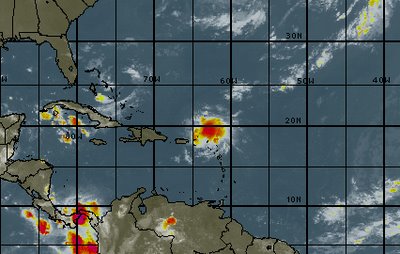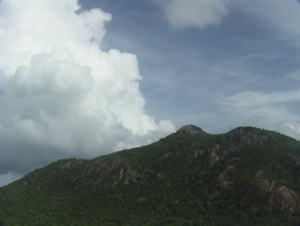The baby-name book of cyclones

Whew.
Tropical Storm Chris passed to the north of our little island a few hours ago. Barring any sudden changes in direction, the misfortune he brings will likely belong to the Bahamians. That's "he," because it's Chris like Christopher, not like Christine. Next up on the list of names is Debby, then Ernesto (that one's bound to devastate Cuba).
The origin of the practice of naming storms is unclear. A 1930s Australian radio broadcaster may deserve the credit, though he named storms more as a criticism of the politicians whose names he used. ("Tropical Storm Cheney just skirted the Lesser Antilles and is now bearing down on the Bahamas"?) Military meteorologists during World War II used the phonetic alphabet system to name storms (Able, Baker, Charlie, and so on). According to the National Hurricane Center in Florida, people in the Caribbean in the 19th century commonly referred to hurricanes by the name of the saint affiliated with the day upon the which the hurricane made landfall. By that method, however, Hurricane Hugo would be called Robert in Guadeloupe and Matthew in South Carolina. The current method was adopted in 1953 when the old Able-Baker system was dropped. Hurricanes were given only female names from then until 1978, when Americans decided not to ratify the Equal Rights Amendment and instead to end the oppressive sexist practice of naming deadly storms after women. Another great victory for the feminist movement.
The task of naming Atlantic tropical storms and hurricanes falls to the National Hurricane Center--part of the federally mandated National Weather Service. The names come from a set of six lists developed by the World Meteorological Organization. Each list contains 21 names, since the letters Q, U, X, Y, and Z are spurned--sorry, Quincy. Storms beyond W are assigned letters from the Greek alphabet. Storms beyond the letter omega will presumably not be named, as the NHC will be under water at that point.
Pacific storms and typhoons are given names and/or numbers depending on the meteorological agency in whose region they form. The NHC keeps six rotating lists of names to cover storms that form in the eastern North Pacific. Strangely, their Pacific lists includes X, Y, and Z, but still skip Q and U. Storms brewing in other parts of the Pacific get named from lists assembled by Fiji, Australia, Papua, the Philippines, or a collection of Pacific rim nations. A number of these nations avoid using people's names, so storms end up getting named after trees, birds, insects, gods, or food. North Korea has suggested the name "Meari," which means echo, and which the DPRK Typhoon Committee thinks appropriate since, "It (Echo) means that once Typhoon forms, the Typhoon Committee's notification echoes over to its members." Commies have always had such a subtle way with words. Weather fans in Macau would like to name a storm "Parma," after a popular Macauan dish of ham, chicken livers, and mushrooms. De gustibus non est disputandem. ("Hurricane Lasagna is due to make landfall on the Florida coast sometime around midnight"?)
Once a storm name earns its 15 minutes of infamy by being particularly deadly or costly, the folks at the NHC retire that name and choose another by taking suggestions from the member countries of the World Meteorological Organization. Names get retired more frequently now than they used to. 2005 marked the last time we'll ever have a hurricane Wilma, Dennis, Rita, Stan, or Katrina. Oddly, category 5 Emily did not earn her retirement, though she killed ten people in the Caribbean and caused hundreds of millions of dollars of damage. Stan got retired despite being only a category 1, since he contributed to flooding in Mexico that killed thousands. Emily will return in 2011, unless we have a remarkably quiet hurricane season. 2004 saw the end of Ivan, Charley and Francis. Fabian and Isabel took their bows in 2003. Only one name, Isadore, was retired in 2002. Hmmm, looks like a hockey-stick trend to me. Somebody get Al Gore on the phone.
Anyway, in the time it's taken to write this, blue sky has begun to appear above our little island. Chris has seen fit to spare us much trouble. May he do the same for the people of the Bahamas.

Blue sky ... a beach day after all?

1 Comments:
Hi tp, thanks for another great post. This and the previous cracked me up. Please post about Lebanon if you could - dpm.
miss you!
Post a Comment
<< Home